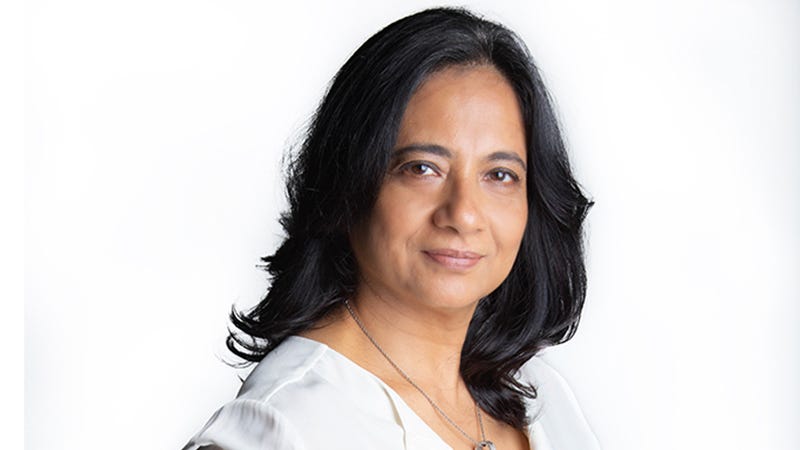Midlife, my terms: Vinti Mittal on choice, courage, and change
As the former Clinical Director at SACAC Counselling, Vinti Mittal has guided thousands through crisis and transition. At Midlife Festival 2025, she will share why midlife is transformation.
This article is part of Human Algorithm’s partnership with Midlife Festival 2025. Join us in Singapore this October for two days of honest, evidence-based, and empowering conversations about navigating midlife transitions. Day 1: Midlife@Work. Day 2: Let’s Talk Menopause and Midlife. Two-day passes are available through both links. Use promo code MF25SHAWN for 5% off tickets.
When people walk into Vinti Mittal’s office, they often arrive at a breaking point.
Some have worked tirelessly for decades, building careers and families, only to find themselves blindsided by the weight of midlife, like a collapsing marriage, rebellious teenagers, career uncertainty, or the quiet grief of ageing parents.
Others are expats, far from home, holding together demanding jobs and fragile support systems.
“The most shocking thing,” she says, “is when someone’s world is collapsing and they can’t see it happening. They continue to make wrong decisions because denial convinces them they’ve got everything figured out.”
Vinti has spent over 16 years in Singapore, working at the intersection of mental health, leadership, and community. As the former Clinical Director at SACAC Counselling, she leads a team of therapists serving both locals and expatriates, mentors the next generation of counsellors, and advocates for more accessible and inclusive mental health services.
Her perspective on midlife is shaped not only by her professional expertise but also by the countless private conversations she has witnessed clients have as they navigate this volatile phase of life.
For women in leadership, the silence around menopause is weighty.
“For many women, sharing health challenges, particularly those related to menopause or perimenopause, feels dangerous,” she explains. “It’s not just embarrassment. It’s the fear of being mocked, sidelined, or even losing their job. These are women who have worked twice as hard to reach leadership roles, and they worry that being open about menopause will undo everything they have built.”
The cost, she notes, is systemic. “Organisations pay for that silence in attrition, absenteeism, presenteeism, and the premature exit of experienced women from the workforce,” she explains.
Cultural expectations deepen the difficulty. Singapore blends Eastern stoicism with Western psychology, and many clients feel torn between “pushing through” as their parents once did and seeking help for themselves.
“Cultural norms encourage perseverance,” she says. “But menopause heightens shame, guilt, and self-doubt. Women often feel they’re the only ones struggling, and asking for help feels like weakness. Psychoeducation is essential, like showing people that seeking help is not a weakness, but a strength.”
Her clients often juggle impossible loads: symptoms of menopause, demanding careers, teenage children, and ageing parents. Vinti’s approach is to strip back the noise.
“We map their roles, professional and personal, and look at the time they devote to each. Then I ask: how much time do you devote to yourself? That’s usually when the realisation hits. If women don’t prioritise self-care, the whole family system risks collapse.”
For expats, midlife often arrives as an identity crisis layered on top of hormonal and emotional change. Without family networks to lean on, many find themselves asking: Who am I now?
Vinti frames this process as a three-stage journey. First, acknowledge the grief of what’s been lost — a marriage, a role, or simply the version of yourself you thought would endure. Second, explore core values: what’s non-negotiable, what can shift, what truly matters. Third, actively redefine identity: reclaim or release roles, build new support structures, and take conscious steps toward living as the most authentic version of yourself.
“It’s not about reinventing from scratch,” she points out. “It’s about returning to your truest self — with all the wisdom and resilience you’ve gained.”
Vinti also makes a point to model what she teaches. She acknowledges her own midlife challenges, including hormonal changes, professional responsibilities, ageing parents, and financial pressures.
Her practices are intentional and practical. For example, she practises reflection before action, engages in technology detoxes, prioritises sleep, nourishing food, and movement as medicine.
“Acknowledgement is everything,” she says. “I ask myself: do I need support for this, or can I manage it now? That small reflection helps me stay grounded.”
Despite progress, she believes stigma remains strong in professional settings “Disclosure is always a risk,” she notes. “But how and to whom we disclose matters. Vulnerability is about connection, not oversharing. When we choose wisely, disclosure can bring validation, support, and change. We need environments that respond to honesty with empathy, not exclusion.”
Despite all the grief, silence, and stigma she has witnessed, Vinti remains hopeful. “Hope is what keeps us moving forward,” she explains. “The more we share, the more awareness we create. With awareness, fewer women will suffer in silence.
Platforms like Midlife Festival are powerful because they educate women, men, and the next generation. That’s how we build a future where women feel seen, heard, and supported, not just in their roles, but in their complete form.”
At Midlife Festival 2025, Vinti will speak on the panel “Midlife, My Terms: Stories of Change, Choice, and Courage”.
Her message is clear: midlife is a powerful transition, and with awareness, support, and courage, it can be the moment we finally live on our own terms.


